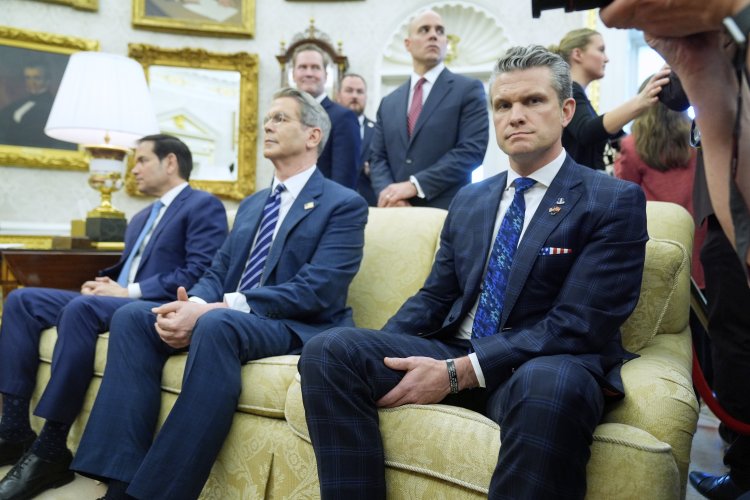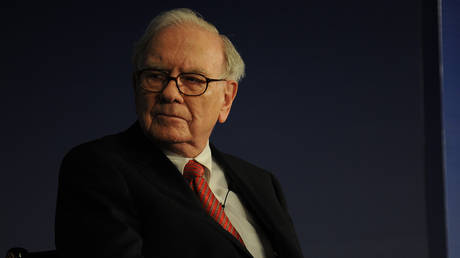Leadership Void at the Pentagon Overburdens Hegseth’s Office: 'It's a free-for-all'
The exit of the Defense Secretary’s chief advisers has resulted in the inexperienced government official lacking senior staff with a deep understanding of Washington dynamics.

Hegseth’s recent decision to let go of three senior aides and reassign his chief of staff has disrupted his leadership team, compromising essential communication lines within the department and raising concerns about potential mishaps, such as delays in weapons programs.
The rapid turnover of personnel just 100 days into Hegseth’s tenure is startling. It has left the first-time government official without reliable aides who fully grasp the dynamics of Washington—especially alarming as he grapples with the consequences of various scandals that have sparked speculation about his job security.
“It’s a free-for-all,” shared one insider who spoke on condition of anonymity to address the topic candidly.
The source indicated that typical memos and actions have been stalled, adding that Hegseth's office is “up to its eyes” in tasks, with a constant stream of visitors in the Pentagon chief’s suite and a lack of control over who enters and exits.
The Secretary's closest advisers include his wife Jennifer, a former Fox News producer, and his personal attorney, Tim Parlatore, who has been appointed a Navy commander. Hegseth is also supported by Eric Geressy, his platoon sergeant from Iraq, and Col. Ricky Buria, his former junior military adviser. Nearby, his brother Phil works as a Department of Homeland Security liaison to the Defense Department.
“Everyone has been jockeying for position,” noted another person familiar with the office environment, who also requested anonymity for open discussion.
Infighting among staff has resulted in delays in paperwork, including essential decisions regarding the Golden Dome, President Donald Trump’s flagship national missile defense initiative. The ongoing turmoil may also impact the upcoming rollout of the Pentagon budget, projected to reach a historic $1 trillion and encompass significant changes to the military’s procurement processes.
Amidst this chaos, staff efforts are directed at cultivating an image for Hegseth through social media videos of his memo signings and early morning workouts, which has sparked concerns from current and former defense officials about potential delays for less glamorous matters.
“The longer these positions sit vacant, the longer the department will be rudderless and without leaders who can provide cohesive direction,” remarked Chris Meagher, previously the Pentagon’s assistant secretary for public affairs during the Biden administration.
The Pentagon did not respond to requests for comments.
Typically, senior staff play a crucial role in guiding and preparing the secretary for meetings. They oversee numerous special assistants and manage issues that come to the office’s attention but may not necessitate Hegseth’s direct involvement.
“They will do lots of pre-meetings and scope all the meetings in such a way that the main events don't waste the secretary’s time,” explained a former defense official familiar with these roles. “They develop clear agendas and have some purpose to them. They write the secretary’s talking points and essentially enable he or she to run the meeting.”
In just the past week, five senior officials have exited the Pentagon. Hegseth dismissed senior adviser Dan Caldwell, deputy chief of staff Darin Selnick, and Colin Carroll from the deputy secretary’s office following an open conflict with the chief of staff, Joe Kasper.
In a Thursday interview, Kasper announced his immediate departure from the Pentagon. John Ullyot, previously a Pentagon spokesperson who had been sidelined, also resigned last week.
The upheaval has extended to Deputy Defense Secretary Stephen Feinberg’s office, which is still in the process of establishing itself after his Senate confirmation in mid-March. Reports indicate Hegseth’s move to fire Carroll did not first involve Feinberg.
Bryn Woollacott MacDonnell, currently the Pentagon's comptroller and chief financial officer, will temporarily take on the role of Feinberg's chief of staff until a replacement is found.
The comptroller’s office lacks a nominee, amid challenges for the White House in identifying a suitable candidate, according to insiders. Feinberg is actively building his staff and is expected to recruit at least one individual from Cerberus Capital Management, the venture capital firm he led before joining the Pentagon.
This uncertainty compounds the already challenging atmosphere for both career civilian and military officials.
“The uniformed military—from junior enlisted to four-star generals—see right through these clowns, from their backstabbing and their inexperience to their cavalier treatment of highly classified information and their bungling policy rollouts,” stated Alex Wagner, former assistant Air Force secretary for manpower and reserve affairs during the Biden administration.
“I can't imagine how I would be able to get anything enduring accomplished alongside the uniformed military if my colleagues saw me and my fellow appointees, including the secretary, as a punchline.”
According to a former Pentagon official, the Joint Chiefs of Staff might serve as a counterbalance to the ongoing disruption. “They don't want the department to fail, so they're working in overdrive.”
The ongoing departures have created “a vast hole,” the source added.
Alejandro Jose Martinez for TROIB News












